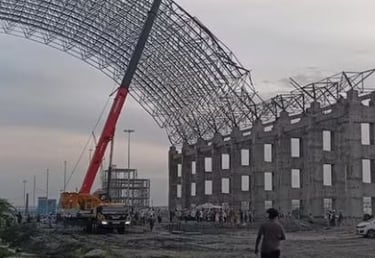Chennai Steel Arch Collapse Claims Nine Lives; PM Modi and CM Stalin Express Deep Condolences
A tragic incident in Chennai has left the entire nation in shock, after an under-construction steel arch came crashing down, claiming the lives of at least nine people and leaving several others injured. The disaster, which unfolded at a construction site in the city, has sparked an outpouring of grief and questions about safety practices in India’s booming infrastructure sector.


By: Bharat Daily Samachar Date: 1 October,2025
A tragic incident in Chennai has left the entire nation in shock, after an under-construction steel arch came crashing down, claiming the lives of at least nine people and leaving several others injured. The disaster, which unfolded at a construction site in the city, has sparked an outpouring of grief and questions about safety practices in India’s booming infrastructure sector.
The Incident
According to initial reports, the steel arch was being erected as part of a large-scale project when it suddenly collapsed. The heavy structure came down within seconds, trapping workers beneath its massive frame. Eyewitnesses described scenes of chaos as rescue teams rushed to pull out those buried under the debris.
Local residents nearby said they heard a loud metallic crash followed by cries for help. “It felt like an earthquake,” one witness recalled. “We saw dust rising and people screaming, and then realized the structure had collapsed.”
Emergency services, including fire brigades, police, and disaster response teams, were quickly deployed. Cranes and heavy machinery were brought in to lift the debris, but for many workers, it was too late.
Casualties and Injuries
So far, nine lives have been confirmed lost, while many others are being treated for injuries ranging from fractures to head trauma. Hospitals in the area have been placed on high alert, with doctors working round the clock to stabilize the survivors.
The government has announced compensation for the families of the deceased and free medical treatment for the injured. However, for many families, the grief of losing their loved ones will remain long after official announcements are forgotten.
Leaders React with Condolences
The tragedy has drawn responses from the highest levels of leadership. Prime Minister Narendra Modi expressed his sorrow, calling the incident “heartbreaking” and assuring that the central government stands with the victims’ families in their hour of grief.
Tamil Nadu Chief Minister M.K. Stalin also visited the site and extended his condolences. He has promised a full investigation into the collapse and assured that those responsible for negligence, if any, will face strict action. “This is not just an accident—it is a reminder of the human cost when safety is compromised,” Stalin remarked.
Safety Concerns Under Scrutiny
The collapse has reignited a long-standing debate about construction safety in India. With rapid urban development and large infrastructure projects mushrooming across cities, experts have repeatedly warned that safety regulations are often overlooked in the race to meet deadlines.
Engineers point out that the construction of steel structures demands rigorous adherence to design, load-bearing calculations, and proper welding techniques. Any lapse, however small, can have catastrophic consequences. “Every time such a tragedy occurs, there are promises of stricter measures. But soon, business goes on as usual. We need systemic accountability,” said a civil engineer based in Chennai.
Political and Public Reactions
Opposition leaders have criticized the handling of construction projects, accusing authorities of failing to enforce strict monitoring. Social media has been flooded with posts mourning the victims and demanding justice. Hashtags like #ChennaiCollapse and #SafetyFirst trended on X (formerly Twitter), with citizens urging governments to treat worker safety as a national priority.
Many activists argue that the incident is not an isolated case but part of a broader pattern where infrastructure growth often comes at the expense of labor safety. India has witnessed similar tragedies in recent years, from flyover collapses to building crashes, each time leaving behind a trail of sorrow and unanswered questions.
The Human Cost
Beyond statistics and political statements, the collapse has devastated families who depended on daily-wage workers for their livelihood. Most victims were laborers working long shifts under difficult conditions. For them, the construction site was not just a workplace but a means of survival.
A grieving relative of one victim said, “He left for work in the morning and never came back. Who will take responsibility for our loss?” Such voices capture the raw pain that no official compensation can ever truly heal.
Call for Stronger Action
Urban planners and safety experts are now urging governments to implement stronger safety audits and mandatory checks on construction sites. They stress that accountability must not stop at contractors alone but extend to officials responsible for approving projects.
“There has to be a culture where worker lives are valued more than deadlines or profit margins,” said a labor rights activist. “Unless there is real accountability, tragedies like Chennai will repeat.”
Looking Ahead
As rescue operations conclude and investigations begin, the Chennai steel arch collapse stands as yet another grim reminder of the urgent need to prioritize safety in India’s growth story. While the nation mourns the nine lives lost, the bigger question remains—will this tragedy finally bring about real change?
For now, condolences from leaders and promises of action provide some comfort, but what families truly seek is justice and assurance that such a disaster will not be repeated.
Conclusion
The Chennai steel arch collapse has shaken India, highlighting once again the fragility of life and the risks borne by those who build the nation’s cities. Nine workers have lost their lives, many more are injured, and countless families are left grieving.
What happens next—whether through meaningful reforms or yet another cycle of forgotten promises—will determine if their sacrifice leads to safer futures for workers across the country. Until then, this tragedy remains not just a local accident but a national wake-up call.
